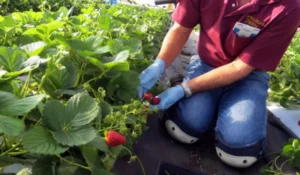If you want juicier fruits, healthier plants, and sustainable gardening, homemade organic fertilizers are the way to go. Whether you’re growing strawberries in containers or apple trees in your backyard, enriching your soil naturally can dramatically improve fruit yield and plant health.
Why Choose Organic Fertilizers?
Organic fertilizers:
- Improve long-term soil health
- Promote beneficial microbial activity
- Are cost-effective and environmentally friendly
- Minimize the risk of over-fertilizing
1. Compost: The Garden Gold
Compost is rich in nitrogen, phosphorus, and potassium—the core nutrients your fruit plants need.
What to Use:
- Vegetable scraps
- Coffee grounds
- Eggshells
- Grass clippings
- Dry leaves
How to Apply:
- Mix into the soil before planting
- Apply as a top dressing during the growing season
2. Banana Peel Fertilizer
Banana peels are full of potassium and phosphorus—great for fruiting plants like tomatoes, berries, and citrus.
DIY Method:
- Chop peels and bury them around your plants
- Blend peels with water for a banana peel smoothie fertilizer
Bonus: Banana peels break down quickly and also attract earthworms.
3. Eggshell Powder
Eggshells are rich in calcium, which helps prevent blossom end rot and strengthens fruit development.
How to Use:
- Rinse and dry shells
- Grind into fine powder
- Sprinkle at the base of plants or mix into the soil
4. Manure Tea
Manure tea provides a balanced dose of nitrogen, phosphorus, and potassium without overwhelming your plants.
DIY Method:
- Fill a cloth bag with well-rotted manure (cow, chicken, or horse)
- Soak in a bucket of water for 2–3 days
- Use the strained liquid to water your fruit plants
Caution: Use only aged or composted manure to avoid burning your plants.
5. Used Coffee Grounds
Coffee grounds are slightly acidic and perfect for acid-loving fruit plants like blueberries and raspberries.
How to Apply:
- Sprinkle around the base of the plant
- Mix lightly into the topsoil
Tip: Use in moderation and avoid mold by allowing grounds to dry first.
6. Seaweed Fertilizer
If you live near the coast, seaweed is a nutrient-rich organic option loaded with trace minerals.
DIY Method:
- Rinse seaweed to remove salt
- Soak in water for several days
- Apply the solution as a foliar spray or soil drench
How Often Should You Apply Organic Fertilizers?
| Fertilizer Type | Application Frequency |
| Compost | 2–3 times per season |
| Banana Peel | Every 2–3 weeks |
| Eggshell Powder | Monthly |
| Manure Tea | Biweekly |
| Coffee Grounds | Every 1–2 weeks (in moderation) |
| Seaweed Fertilizer | Monthly |
Final Tips for Success
- Test your soil to identify nutrient gaps
- Alternate fertilizers to give a balanced nutrient profile
- Avoid overfeeding, especially with nitrogen-rich fertilizers
- Water well after each application
- Stay consistent—organic fertilizers work best over time
Conclusion
Organic fertilizers offer a safe, sustainable, and rewarding way to nourish your fruit plants. With ingredients you likely already have at home, you can create a rich environment for fruiting success—no chemicals needed.
Get your compost bin going, save those banana peels, and watch your garden flourish naturally.


